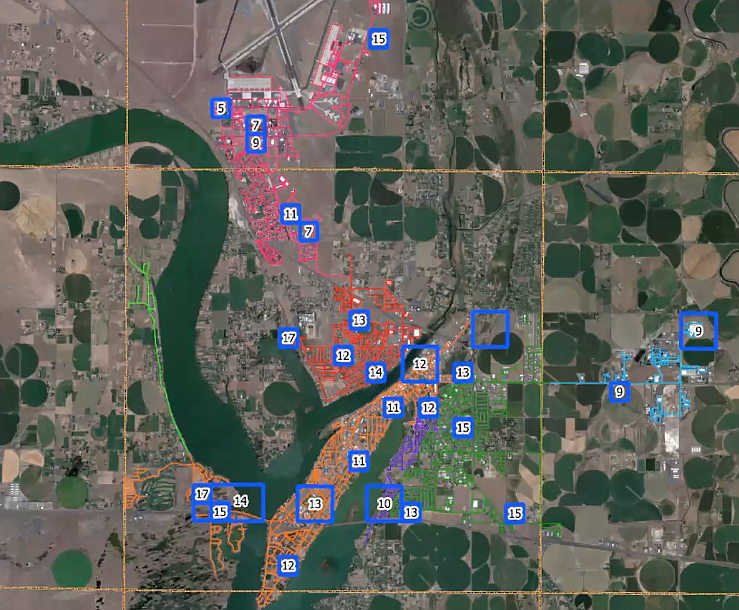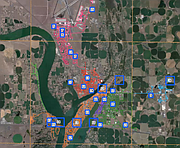Water needs loom: Moses Lake eyes future of the city’s supply
R. HANS MILLER | Hagadone News Network | UPDATED 4 years, 2 months AGO
Managing Editor Rob Miller is a 4-year U.S. Army veteran who grew up in Western Montana in a community about the size of Soap Lake. An honors graduate of Texas State University, he enjoys spending time with his wife, Brandee, and their three dogs, Draco, Pepper and Cinnamon. He has one son, William. During his free time, he enjoys photography, video games, reading and working on the house he and his wife bought in Ephrata. He is passionate about the First Amendment and educating communities. | December 31, 2021 1:07 AM
During its last meeting of the year, the Moses Lake City Council heard an update on the city’s fresh water supply and the need to maintain and expand water sources for the city over the next two decades with certain city wells having reduced water levels.
“These declines are sort of concerning, especially when you start thinking about the future of where the water supply is coming from,” said Jill Van Hulle, an associate water rights specialist with Aspect Consulting LLC, the city’s water management advisers.
Van Hulle reviewed challenges Moses Lake is facing regarding water management on Dec. 14. She said the Washington State Department of Ecology denied seven applications for changes to how the city manages water in 2020. Those applications were related to shallow groundwater sources. These applications were important because the city’s seven deeper wells have all seen declines in water levels from 50-300 feet over the last 60 years. Those declines are relative to age, she said. In comparison, the shallower wells have recharged more quickly and the associated aquifer has not been significantly impacted. As a result, the city tried to move to additional shallow wells, but the Department of Ecology’s denials have, at least temporarily, blocked the additional wells from being drilled.
To remedy the situation, Van Hulle said she and her coworkers collaborated with city staff to identify options to move forward with the wells. The first step, she said, was to appeal the Department of Ecology’s initial decisions on the water rights requests from 2020. The city has hired Cascadia Law Group, a firm specializing in this type of legal practice, to assist with the aspect of water management.
“There’s actually seven different water rights that the city has shown an interest in acquiring. We’re moving four of those through the change process and are up to 16% (of the city’s water supply once those are added). With all seven of those change applications, we will have gone up to 23%,” Van Hulle said.
Those additional water rights, if successfully appealed, will add about 1,600 acre-feet of water to the city’s core water rights, Van Hulle said.
An acre-foot is about 326,000 gallons of water, according to WaterEducation.org, so 1,600 acre-feet is roughly 5.2 million gallons.
The next step was to identify options for shallow well locations, which may be more appealing from the Department of Ecology’s standpoint. In doing so, more than two dozen potential shallow well locations were identified, she said.
According to a map displayed by Van Hulle at the meeting, the 30 potential shallow well locations are scattered throughout Moses Lake. Aspect Consulting and city engineers have worked together to rate those potential shallow well sites according to which would best serve the city’s needs, Van Hulle said. Certain areas with higher water demand were prioritized for well development, she added. Superfund sites near the city were taken into account in the process.
“There’s obviously some sensitivities to developing wells in that area, but we had some other ideas in terms of how wells are constructed, identifying areas where future water rights could be acquired. There are several large, very desirable water rights that are very close to areas that may eventually be annexed into the city, and so we wanted to be proactive in terms of identifying those so that we have sort of a top-10 list,” Van Hulle said.
According to the Moses Lake Comprehensive Plan, without additional water rights being obtained, the city would be in a difficult freshwater position in 2049.
Moses Lake City Manager Allison Williams said Aspect Consulting was acting as a staff person in many respects regarding water planning and asked council members to approve a new contract with the firm for an estimated cost of $34,500. Council later unanimously approved the contract.
Williams also said the city is working with the Bureau of Reclamation regarding using reclaimed water to irrigate city parks rather than using freshwater sources.
“We’ve opened the conversations and we just need to formalize that work. … We’ve had informal conversations and so we just need to initiate the formal conversations and that will happen next,” Williams said.
ARTICLES BY R. HANS MILLER

Suspect in 2022 murder of Moses Lake woman expected to change plea
EPHRATA — Juan Gastelum, 31, of Hermiston, Ore., the suspect in the March 2022 killing of Yanira Cedillos, is expected to change his current plea of not guilty to a guilty plea. Prosecutors in the case have requested that a plea change hearing be set for March 3, according to court documents.

Counselors help students plan ahead at Ephrata High
EPHRATA — Planning for the future isn’t something freshmen in high school gravitate toward, but the four guidance counselors at Ephrata High School point them in the right direction to get their futures planned.

Multiple projects coming to Ephrata in ‘26
EPHRATA — Multiple civic projects are coming to Ephrata this year as spring starts to waive at us from the not-too-distant future. Park upgrades, sports facility improvements and roadway upgrades are among them, according to Ephrata City Administrator Ray Towry.



